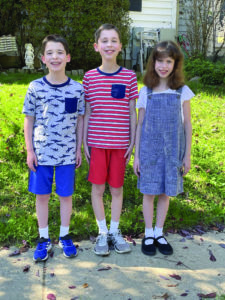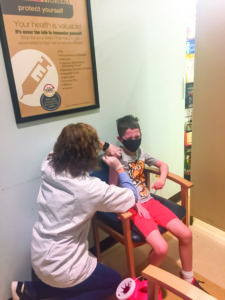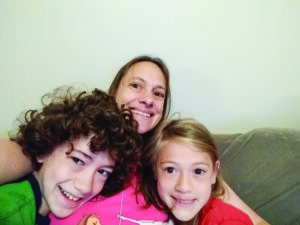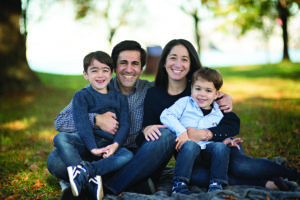
By Rudy Malcom
While Renee Goldschmidt’s three children, a 12 year old and two 11 year olds, go to Sunday school in person at the Chabad of Owings Mills, they attend Franklin Middle School virtually because of the risk of COVID-19. Since the pandemic started, the Goldschmidts have socialized only with their grandparents, outside of Sunday school.

Goldschmidt is eager for the day kids younger than 12 can start receiving COVID-19 vaccines. And that day could be coming soon, as early as by the end of this month.
On Sept. 20, Pfizer and BioNTech announced that their vaccine was safe and effective for children ages 5 to 11. And on Sept. 28, the companies submitted their data to the Food and Drug Administration for initial review, indicating that they will soon likely seek emergency use authorization for the pediatric dose of their vaccine. However, the Wall Street Journal reported that Pfizer may not finish its application until mid-October, meaning that the FDA may not make its decision until sometime in November.
“I just want them to come out with it already,” said Goldschmidt, a homemaker who lives in Reisterstown. “My twins are starting middle school. It’s a huge thing, and they can’t socialize. And to be honest, I need my breaks. I literally have not had a break since the start of the pandemic, not one day.”

vaccine.
Goldschmidt’s 12 year old, Connor, has been vaccinated since the spring, when the Pfizer vaccine was authorized for his age group, but the family is particularly worried that he’ll spread the virus to one of the twins, who is immunocompromised.
“If Jacob gets a simple cold, we can end up in the ER,” Goldschmidt said. “One time he got strep, and his fever was so high he had a seizure. We had to call an ambulance.”
Goldschmidt was only 26 weeks pregnant when her twins were born, each weighing less than two pounds.
“The NICU doctors came in and said, ‘We don’t know if they’re going to make it. And if they do make it, they may face serious issues their whole lives.’ We have been pretty lucky,” she said.
But Goldschmidt doesn’t want to push that luck. As soon as the vaccine is authorized, she said, “we’re going.”
The twins are among about 28 million children ages 5 to 11 in the U.S. who would be eligible, a group far greater in size than the 17 million ages 12 to 15 who became eligible in May. While most kids face a much lower risk of severe illness, inoculating them is an important tool in controlling the pandemic. Children made up more than a quarter of new cases for the week ending Sept. 23, the American Academy of Pediatrics reported.
Yet inoculations have lagged among older children; only about 43% of children ages 12 to 15 in the U.S. have been fully vaccinated, compared with 66% of adults, according to federal data. In Maryland, rates are higher; 63% of children in that age group are fully vaccinated, along with 73% of adults ages 18 to 64 and 96% of adults 65 and older.
So far, the Pfizer vaccine is the only one available to Americans under 18. In June, Moderna filed for authorization of its vaccine for adolescents ages 12 to 17. In July, Johnson & Johnson announced plans to begin studying its single-dose vaccine for that age group this fall.
Parents are slowly becoming more comfortable with the idea of their children getting vaccinated. In mid-September, around when schools reopened and hospitalizations and deaths soared due to the highly contagious delta variant, the Kaiser Family Foundation conducted a nationally representative survey; 34% of parents interviewed said they would have their children ages 5 to 11 vaccinated as soon as possible, up from 26% in July.
Rates may prove higher in Baltimore. Compared to other jurisdictions in the “semi-urban, mid/low socioeconomic status” cohort, the city has reported consistently higher vaccination coverage since June, according to a Johns Hopkins Bloomberg School of Public Health analysis released last month.
Similarly, among religious groups, Jewish Americans are most likely to be “vaccine accepters,” with 85% vaccinated or planning to get the shot, a July report from the Public Religion Research Institute found. The proportion was the same in March, whereas all other religious groups saw at least 10-percentage- point increases in acceptance since then.
Due to unsubstantiated rumors, some Jews, particularly in the Orthodox community, fear that the vaccine causes infertility.
Ilya Burdman, who works in cybersecurity, observes that many fellow members of the ARIEL Jewish Center and Synagogue, a Chabad congregation in Pikesville for Russian-speaking Jews, are wary of vaccinating their children, even if they themselves are vaccinated.
“I think they mistrust the science behind it, and it makes sense,” he said. “They are former Soviets; their government kind of screwed them constantly. They have this distrust of their government.”
Burdman doesn’t think that he can “change their minds.” He described the vaccines as “overwhelmingly positive,” noting that his two 12 year olds got the vaccine and that his 9 year old will do the same once it is authorized.
He recalled how his parents suffered from COVID-19 during the summer of 2020, before the vaccine was available.
“They had to go through two weeks of pretty much not being able to get up. They had difficulty breathing, and I don’t want that experience for my children,” he said. “It’s something I would try to prevent as much as possible.
“The vaccine is very important to have,” he added. “It’s extremely safe, and I think COVID will not be going away anytime soon.”
Both the Pfizer and Moderna vaccines have been linked in rare cases, particularly among young men, to myocarditis, a condition that causes an inflammation of the heart muscle. However, concern about this side effect could be reduced by the lower doses that children would receive of the Pfizer vaccine. In Pfizer’s trials, the smaller doses produced similar antibody responses to those seen in a study of 16 to 25 year olds who received full doses.
Some parents worry about the relatively small size of the trials and about a lack of long-term data on the safety of the shots. In general, parents tend to be skeptical of new vaccines. For example, while the varicella vaccine, which protects against chickenpox, was highly effective and showed few side effects, parents were hesitant to adopt it once the FDA approved it in 1995, with only one-third of eligible adolescents fully immunized by 2008.

Sharone Cheskis, a religious school parent at Beth Shalom Congregation in Columbia, said her 13-year-old son, then 12, was among the first to get the vaccine when it was approved for his age group.
“He was bouncing off the walls excited,” she said. “It’s really made us feel more comfortable. He’s around a lot of other kids, so it’s important for us that he has that layer of protection.
“For our younger son,” who’s 9, “we’re going to do the exact same thing,” she added. “Both my boys play sports, they’re in public school, they go to services — we’re just around a lot of people.”
Cheskis is a speech language pathologist at Prince George’s County Public Schools. She said that the pandemic has been hard for many of the kids that she sees, as it has prevented them from talking with people outside of their families.
“There’s been a certain amount of drop in skill,” she said, adding that the vaccine would help “kids to get back to closer to where they were” before COVID-19.

Lucy Leibowitz, a pediatric psychologist, said it is “too soon” to say how the pandemic overall will impact children in the long term, as “we are still very much in it.”
She plans to vaccinate her 7 year old as soon as possible, which would bring “peace of mind” when visiting family. However, her 4 year old would remain ineligible.
“It would probably be similar to how things were when my husband and I got vaccinated,” she said. “It’s not drastically going to change what we’re doing.”
Leibowitz, whose children attend Sunday school at Beth El Congregation of Baltimore, said changing public health guidelines and conditions can be confusing for kids.
“I took off my mask while talking to one of my kiddo’s friend’s parents at an outdoor playdate, and my 7 year old said, ‘Mom, put your mask back on,’” she said. “I explained, ‘We are both vaccinated, we are outside and I made the determination that this is safe.’”
As the pandemic ebbs and flows and as vaccines and more information become available, Leibowitz advises parents to be open with their children about their decisions about participating in certain activities.
“Rather than just saying ‘you have to do this,’ explain the reasons why you do this in kid-appropriate language,” she said.
Rudy Malcom is a freelance writer.







